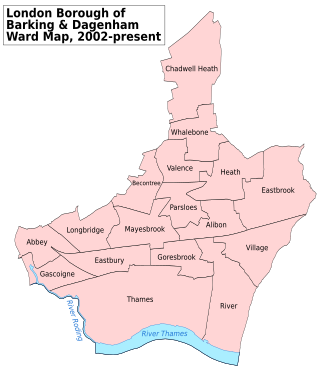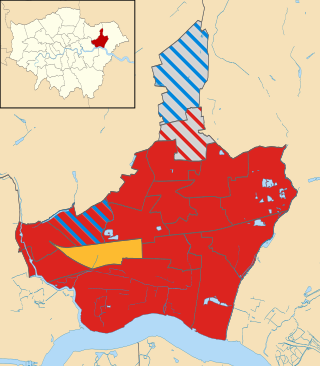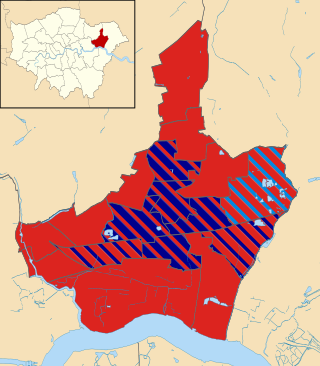Related Research Articles

Barking and Dagenham London Borough Council in London, England is elected every four years. Since the last boundary changes in 2022 the council has comprised 51 councillors representing 19 wards, with each ward electing two or three councillors. Elections are held every four years.
The 1998 Barking and Dagenham London Borough Council election took place on 7 May 1998 to elect members of Barking and Dagenham London Borough Council in London, England. The whole council was up for election and the Labour Party stayed in overall control of the council.

Elections for Barking and Dagenham London Borough Council were held on 2 May 2002 to elect members to the council. All seats were up for election following boundary changes since the last election in 1998. The Labour Party kept overall control of the council, but lost 5 seats. Overall turnout was 22.76%.

Elections for Barking and Dagenham London Borough Council were held on Thursday 4 May 2006. The whole council was up for election. Barking and Dagenham is split up into 17 wards, each electing 3 councillors, so a total of 51 seats were up for election.

Harrow London Borough Council in London, England is elected every four years. Since the last boundary changes in 2022, 55 councillors are elected from 22 wards.

Lewisham London Borough Council is the local authority for the London Borough of Lewisham, in London, United Kingdom. Elections are held every four years using a plurality bloc vote electoral system for the councillors and the supplementary vote electoral system for the elected mayor.

The 2010 Barking and Dagenham Council election took place on 6 May 2010 to elect members of Barking and Dagenham London Borough Council in London, England.

Merton London Borough Council in London, England is elected every four years; it has administrative control over the London Borough of Merton.
The 1986 Newham Council election for the Newham London Borough Council was held on 8 May 1986. The whole council was up for election. Turnout was 30.7%. Labour, for the first time, won all 60 seats.
The 1982 Newham London Borough Council election for the Newham London Borough Council was held on 6 May 1982. The whole council was up for election. Turnout was 27.0%. The Labour Party held onto its overwhelming majority.
The 1978 Newham London Borough Council election for the Newham London Borough Council was held on 4 May 1978. The whole council was up for election. Turnout was 26.8%. The Liberal Party didn't stand in the elections. The Labour Party held onto its overwhelming majority.
The 1998 Newham London Borough election for the Newham London Borough Council was held on 7 May 1998. The whole council was up for election. Turnout was 28.4%. Labour won every seat for the second time since the councils formation.
The 1974 Barking Borough Council election took place on 2 May 1974 to elect members of Barking London Borough Council in London, England. The whole council was up for election and the Labour Party stayed in overall control of the council.
The 1978 Barking Borough Council election took place on 4 May 1978 to elect members of Barking London Borough Council in London, England. The whole council was up for election and the Labour Party stayed in overall control of the council.
The 1986 Barking and Dagenham Borough Council election took place on 8 May 1986 to elect members of Barking and Dagenham London Borough Council in London, England. The whole council was up for election and the Labour Party stayed in overall control of the council.

The 1990 Barking and Dagenham Borough Council election took place on 3 May 1990 to elect members of Barking and Dagenham London Borough Council in London, England. The whole council was up for election and the Labour Party stayed overwhelmingly in overall control of the council.
The 1994 Barking and Dagenham Borough Council election took place on 5 May 1994 to elect members of Barking and Dagenham London Borough Council in London, England. The whole council was up for election and the Labour Party stayed in overall control of the council.
The 1982 Islington Council election took place on 6 May 1982 to elect members of Islington London Borough Council in London, England. The whole council was up for election and the Labour party regained overall control of the council from the Social Democratic Party.

The 2018 Newham London Borough Council election was held on 3 May 2018 to elect members of Newham London Borough Council in England. This was on the same day as other local elections.

The 2018 Barking and Dagenham Council election took place on 3 May 2018 to elect members of Barking and Dagenham Council in London. This was on the same day as other local elections. The Labour Party won every available council seat for the third election in a row, winning 74% of the popular vote. The Conservatives saw their vote share rise by 13 percentage points, but failed to win any seats.
References
- 1 2 3 4 5 6 7 8 9 10 11 12 13 14 15 16 17 18 19 20 "London Borough Council Elections 6 May 1982" (PDF). London Datastore. Greater London Council. Retrieved 29 March 2015.
- 1 2 3 4 5 6 7 8 9 10 11 12 13 14 15 16 17 18 19 "London Borough of Barking & Dagenham Election Results 1964-2010" (PDF). Elections Centre. Plymouth University. Retrieved 19 May 2018.
- 1 2 3 "London Borough Council Elections 8 May 1986" (PDF). London Datastore. London Residuary Body. Retrieved 29 March 2015.